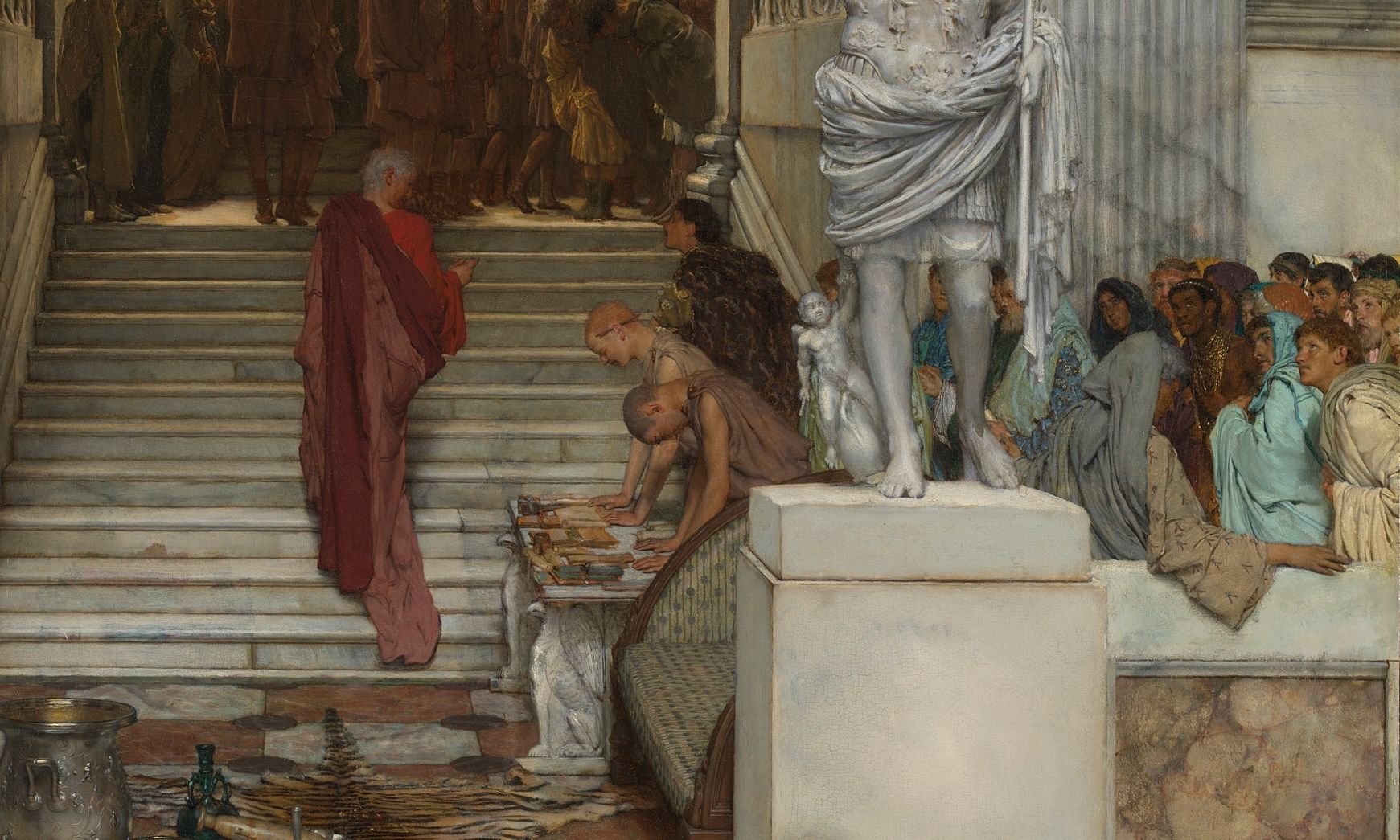The painting focuses on Marcus Vipsanius Agrippa, who was the son-in law of Emperor Augustus Caesar and the financier of notable Roman buildings such as the Pantheon and the Basilica of Neptune
Photo: The National Gallery Photographic Department
The National Gallery in London has acquired a major work by the Victorian painter Lawrence Alma-Tadema, in a sale negotiated by Christie’s auction house. The painting, titled After the Audience (1879), was purchased for £2m from the Pre-Raphaelite collector Isobel Goldsmith.
After the Audience encapsulates Alma-Tadema’s fascination with ancient Rome. It depicts Marcus Vipsanius Agrippa, the son in law of the Emperor Augustus, climbing a staircase at his villa. At the bottom of the steps lies a pile of gifts he had received from citizens across the empire, a crowd of whom are depicted gathered on the right of the frame.
The picture was painted for the attention of the engineer and industrialist William Armstrong, who had seen another work by the artist, An Audience with Agrippa, at London’s Royal Academy in 1876. Yet the artist’s decision to try his hand at depicting the end—rather than the beginning—of the meeting seems to have put Armstrong off from purchasing the new version.
Nevertheless, it is widely considered to be one of the artist’s masterpieces of the period, noted for its scale and complexity of composition.
Alma-Tadema is one of the best-known artists of his time in Europe. Born in the Netherlands, in 1836, he studied and worked in Belgium before moving to London in 1870. He is often associated with the Pre-Raphaelite Brotherhood, many of whose members he befriended, and with whom he shared a Romantic style. His love for antiquity, however—sparked by a tour of Italy during his honeymoon—also links his work to that of academic artists such as Frederic Leighton. He became a member of the Royal Academy of Arts in 1879 and was knighted 20 years later.
After the Audience is the first work by Alma-Tadema to enter the National Gallery’s collection. Its acquisition, part of the gallery’s ongoing 200th anniversary celebrations, brings to the gallery a fresh example of “Neoclassicism and Aestheticism, two important artistic movements within the Western tradition that have largely been unrepresented at Trafalgar Square from the mid 20th century,” says Christine Riding, the institution’s curator of British paintings and director of collections and research.
“The picture complements the long-term loan of Cimabue's Celebrated Madonna by Leighton (on loan from His Majesty The King), and relates to other 19th-century artists influenced by the classical tradition, as can be seen with Ovid among the Scythians by Eugène Delacroix,” Riding continues.
The sale was facilitated by Christie’s private sales department. Peter Brown, the auction house’s senior director, British & European art, said in a statement: “Christie’s is delighted to have brokered this sale to the National Gallery on behalf of Isabel Goldsmith. The picture is of outstanding quality and is testament to Miss Goldsmith’s impressive connoisseurship. It is very satisfying that Before the Audience and After the Audience are now both in public collections, in Kilmarnock and London.”
Gabriele Finaldi, the director of the National Gallery, said: “We continue to celebrate our 200th anniversary with our third acquisition this year. We can now represent in our collection the Dutch artist Lawrence Alma-Tadema, who, after settling in London became a very important figure in the British art world of the late 19th century. We are grateful to the legacies of Martha Doris Bailey and Richard Hillman Bailey, Gillian Cleaver, and Sheila Mary Holmes, with the support of the National Gallery Trust, for enabling us to buy this outstanding picture.”

